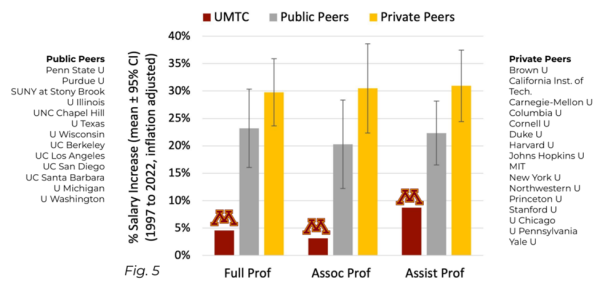The University of Minnesota is requesting $45 million to support its core mission, including increasing wages for faculty and staff.
The supplemental budget request was discussed with faculty at the Faculty Consultative Committee (FCC) meeting on Jan. 18. Melisa López Franzen, the executive director of government and community relations, attended the meeting to gather support for the request before the upcoming legislative session. López Franzen is a former senator, herself.
According to a report published by the FCC, faculty salaries at the University rank at the bottom of the Big Ten universities after adjusting for cost of living.
Mark Bee, chair of the FCC, said faculty salaries at the University have been in decline for the past few decades. He does not believe that the $45 million will reverse the decline.
“Is it enough to make any sort of reasonable recovery from the decline we’ve undergone in the last 20 years? Absolutely not,” Bee said.
The University Senate in April 2023 unanimously passed the Workforce Reinvestment Resolution, which requested the University’s administration allocate more money for its employees. This is part of the first principle of that resolution that employees receive fair and competitive compensation.
According to the resolution, the decline in state appropriations has left faculty and staff with greater workloads that are not fairly reflected by their salaries.
The FCC published the Driven to Recover report on faculty compensation on Nov. 16, 2023. The report found faculty salaries at the University have fallen well behind salaries at its peer institutions.
According to the report, the University has become uncompetitive as faculty salaries have not kept up with peers. Across peer groups, faculty salaries at the University rank in the lower 1/4 to 1/3.

The report illustrates inflation-adjusted salary increases from 1997 to 2022 at the University of Minnesota – Twin Cities and other peer institutions. Within that period, the average faculty salary increases were 25% higher at private institutions and 16% higher at public institutions.
“It took 20 years to dig this hole,” Bee said. “We’re not going to get out of it in one budget cycle or even two or three or five probably.”
Franzen said the last 20 years or more have seen a serious decline in state investments in higher education in Minnesota.
“We’re not able to spend the dollars in our institutions on one of the biggest drivers of how this place operates, which is people and staff and faculty,” Franzen said.
Because of this, Franzen said it is difficult to compare the University with schools that may not have seen a similar decline. Unless they are getting funding from a foundation, philanthropy or research, a major part of faculty compensation comes from the legislature.
“We need a strong partnership from the state so we’re able to do our core mission,” Franzen said. “We can’t do our core mission without faculty. It’s just not sustainable.”
According to the FCC’s Driven to Recover report, the state’s per capita investment in higher education fell from the 78th percentile to the 49th percentile between 2002 and 2007, plunging to the 43rd percentile after the 2008 financial crisis.
Andria Waclawski, a spokesperson for the University, said in an email to the Minnesota Daily that Ettinger showed his support for increased faculty and staff compensation as part of the supplemental budget request at the Board of Regents meeting on Oct. 12, 2023.
“We need to acknowledge and support the needs of our faculty and staff, particularly around issues of compensation,” Ettinger said at the board meeting.
Rep. Gene Pelowski, the chair of the Higher Education Finance and Policy Committee, said in an email to Daily that he discussed the size of the budget with Ettinger and Chancellor Scott Olsen over lunch Thursday. However, he said he could not promise that the supplemental budget request would be granted.
According to the University’s presentation given at the capital on Oct. 30, 2023, in anticipation of this upcoming legislative session, the supplemental budget will be used to support students as part of the University’s core mission supplement.
“The University thinks it can achieve excellence and student success without fairly compensating faculty,” Bee said. “As if faculty have nothing to do with it.”














Concerned Parent
Feb 3, 2024 at 8:33 pm
Compensation for qualified and competitive faculty should be a priority before new buildings and pet projects of certain leaders.